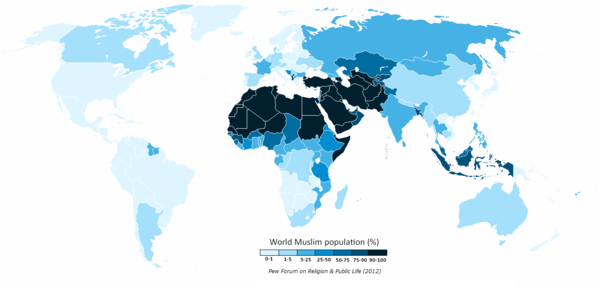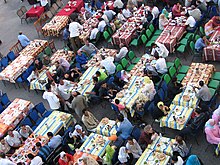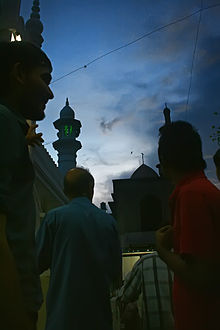Ramadan Ramadan is the 9th month of the Islamic calendar and the holiest month, lasting 29 to 30 days. During this time, Muslims will fast during the day, and almost all restaurants will not open before dusk. From morning to night, Muslims cannot eat anything (including water, cigarettes). Non-Muslims do not have to comply, but try not to eat in public because it is impolite. The length of work will also be shortened. The exact date of Ramadan depends on local astronomical observations, which may vary from country to country. Ramadan ends atEid al-Fitr, This festival may last for several days.
|


For many foreigners, toMuslimCountry travel, in addition to visiting the lively bazaar and tasting local delicacies, there are bound to be other activities. But you need to pay attention: if you travel to Muslim countries during Ramadan, the most sacred and important month in Islam, you will find that there are almost no people in Bazari on the road, and it will become too much if you want to buy something on the street. more difficult.
Ramadan(Arabic:رمضان,English: Ramadan, also known as "Ramadan", "Ramadan", "Ramadan") is in the ninth month of the Islamic calendar. Muslims enjoy pleasure during this grand festival, but for many non-Muslims, traveling and living in Muslim countries at this time will experience great inconvenience and constraints. But if you think about it from the other side, this may also provide tourists with an opportunity to take a look at the different aspects of Muslim social life. Ramadan is sacred and important to Muslims, and as a tourist, if you have a basic understanding of this, your trip will be full of excitement.
understand
Ramadan actually existed before Islam was founded, when Arabs fasted between moonrise and moonset. In the Qur'an, the time of fasting has changed from sunrise to sunset, and the rules have become more stringent. At the same time, September has become a "forbidden month." Except for special conditions, almost all adult Muslims must Observe fasting.

During Ramadan, Muslims must not eat or drink during the day, not eat or drink, smoke, have sex, or do anything that contradicts Islamic law. Therefore, traveling to Muslim countries during Ramadan has an additional hassle.


Most of the time, Muslims devote themselves to faith and religious activities and spend a day full of patience, abstinence, and reflection. This situation is not limited to Islam, but also the Yom Kippur in Judaism and Lent in Christianity. Ramadan is one of the "five merits" of Muslims.
During Ramadan, Muslims study scriptures and pray to Allah; fasting to experience the suffering of the poor, strengthen willpower and self-control, and inspire compassion and compassion. In addition, it also provides relief to those in need, which is called "zakat".
Although traveling to Muslim countries in Ramadan is not as comfortable and convenient as usual due to the changing pace of life, you can feel a completely different cultural experience. Not only do Muslims usually have different meal times, but also the opening hours of stores. During this period, in Muslim countries, people only work at night. The daily schedule of the school will remain the same as usual, but it will be more convenient for fasting people. So if you hold a teaching position in a Muslim country, or some students are Muslims, you should remind them to get up early to catch fasting.
Suhour and Iftar

The main custom of Ramadan is fasting from sunrise to sunset (not necessarily referring to the local sunrise and sunset, because sunrise is very early and sunset is very late in high latitudes), and there is a meal before and after the fast. . What I eat before dawn is called "Fasting"(Suhoor/Sehri), eat before the Fajr.
Iftar(Iftar) is the meal that ends the fast after the evening prayer (Maghrib). Compared with the more private fasting meal, iftar meal is more social. Families and friends get together at home and enjoy happiness. Traditionally, there are various sweets and desserts on the dinner table. There are also many people who go to restaurants to break fast. The restaurants will be busier than usual and they will also provide special dishes. If someone invites you to eat iftar, you can bring some small gifts (such as food) to the banquet.
The ingredients for Iftar are different, but one thing is universal-dates, especiallySaudi ArabiaThis is also a souvenir worth buying.
respect
As the old saying goes, "Do as the locals do", and it should be the same in Muslim countries. Non-Muslims do not have to fast or follow Islamic customs, but they should also respect local laws and customs. In fact, not all Muslims must fast during Ramadan, and some Muslims who are traveling may not necessarily fast.
In fact, the most difficult thing should be: You have to avoid eating, drinking and smoking in public during the day. In some Muslim countries, such asSaudi ArabiaAccording to the law, if you eat and drink in public during the day during Ramadan, it is a crime and will be prosecuted. The police will patrol the streets and any offenders (whether Muslim or not) will be fined. There are such cases in the Gulf countries. Eventually foreigners were deported and Muslims in their own countries went to prison. Therefore, even if the law does not provide for it, it is best for you to avoid such behavior, so as not to attract the strange eyes of others, and at the same time show respect for the fasting person.
You can consider storing some snacks and beverages in your hotel room, and you can take them when you need them. If your place still provides food for tourists during Ramadan, also accepttipIf you do, try to tip as much as possible.
Don't show affection with the opposite sex in public (even if you are married). Such behavior is impolite in Muslim countries and is even prohibited by law in some places. During Ramadan, this should not be done even more. And this kind of behavior between same sex is taboo/illegal in many Muslim areas; seeLGBT travel. Even in places with a little freedom, you'd better exercise restraint, especially during Ramadan.
Dress appropriately in public. Although this rule applies at all times in Islamic areas, you should be more careful during Ramadan and dress more conservatively than usual. If your arms, legs, shoulders, and hair are not covered and exposed, you may offend others.
It is best not to play loud music or dance in public places (including in the car), as this will be considered impolite behavior.
Some mosques are open to tourists and may be closed during Ramadan, or there may be special visit arrangements.
It is best not to chew gum or smoke in public, because this is also a violation of fasting regulations.
working life
If you plan to travel to a Muslim country during Ramadan, please think twice, because many companies will be closed throughout the month, leaving only key staff to work. Even if it is not during the day, the working status of employees will be affected by fasting. If you have to travel to those countries at this time, it is best to adjust the agreed time earlier, because your partners tend to be more energetic in the morning, and the physical and mental state of the afternoon may be affected by the fast and not as good as before. At the same time, people who endure hunger and fatigue will not be in good physical and mental state, so if you meet your partner in a bad mood, forgive him/her.

In some countries where tourism is prosperous, such asMoroccowithTurkeyMany tourist facilities are still open to non-Muslim tourists to a limited extent, and the local area still maintains its usual daily routine. However, the situation in other places is quite different-such as some conservative countries: Iran, Pakistan and Bangladesh, and possibly even the UAE, where the tourism industry is thriving. There are many rules and restrictions, and few shops open during Ramadan. Most restaurants are closed during the day, and in places such as Turkey, Morocco,DubaiIn these places with a large number of tourists, some restaurants will be open to non-Muslims; likeMalaysiaThe same is true for countries with large non-Muslim populations. The dining area is generally separated by a curtain or curtain. In some places, you may be asked by the staff to confirm whether you are a Muslim. In small towns and places where there are not many tourists, it is difficult to find open-air restaurants. You may have to dine in the hotel; but in big cities, just ask the hotel receptionist and you can find a good restaurant. Although in some countries, you may also buy takeaway food from fast food chains at gas stations, but this is different from place to place. byUAEFor example, in Dubai, you can buy food at a gas station, but the more traditionalSharjahIn the Emirates, these places will also be closed during the day. It should be noted that it is almost impossible to buy alcohol in Muslim countries during Ramadan. All in all, you should proceed with caution everywhere, respect Islamic traditions, and avoid offending local culture.
Your itinerary is best matched with the activities of the locals: relax in the afternoon, take a break from the heat wave, take a nap, and welcome the evening feast. If you are not a Muslim, you can still eat and drink. People during Ramadan are basically "night owls." After the iftar, the "feast" opens-business districts and bazaars are often crowded and open until midnight. The streets of big cities are brightly lit until the early hours of the morning, and some people stay up all night until fasting.
Even if you have no friends in a Muslim country, you can enjoy Iftar with local Muslims. Tents or tables are set up on the streets and in Bazari to provide free food for fasting people, and non-Muslims can also take it. In many places, especially in traditional bazars, restaurants are open for business after evening prayers until midnight.
If you are a Muslim, to enjoy the pleasure of Iftar, it is best to go to the mosque. There are usually special arrangements in the temple to provide free meals. This gives you the opportunity to enjoy free food with the locals. If you are traveling in a non-Muslim country, you can also find halal restaurants around the mosque. In the joy of breaking the fast, people tend to be warm and friendly and willing to share a good time with everyone. Some restaurants will provide a special halal buffet, and some also provide free drinks.
It is strongly recommended that you bring food and water when you go out, because the food shops on the street will be closed and will not reopen until two or three hours before the Iftar. Although some star-rated hotels and convenience stores also sell food during the day, it is not necessarily available in every place. The bazaar is usually open two or three hours before the iftar meal, and there is a lot of food and drink, but the taste is mainly sweet. Do not eat and drink in public (including transportation) during the day, because there are also fasting passengers among the passengers. Airlines in Muslim countries do not often provide food to passengers (even if the passengers are not Muslims). If food is provided on the flight, it is best not to order food, so as not to offend other Muslim passengers on the plane. Children do not need to fast, they can eat and drink freely.
Try to avoid going on the road during the Iftar. At this time, the traffic will be jammed, people are eager to go home and eat with their families, and the possibility of accidents will increase. Before the time of Iftar, there are fewer people and vehicles on the street; when it is time for Iftar, the roads in big cities will also be empty. Therefore, public transportation in some countries may be suspended for a short period of time (about half an hour). Three days before and after Eid al-Fitr, traffic conditions will deteriorate, there will be congestion, and public transportation will become congested. Taxis can be difficult to find and the price is higher than usual. In the week after Ramadan, residents will choose to go to tourist attractions for vacation, where hotel prices will increase; the situation in big cities is just the opposite.
In some places, there are guards who beat the drums at dawn to wake people up to eat fast. If you don’t want to wake up so early, it’s best to wear earplugs.
Eid Mubarak

Eid al-Fitr is a festival to celebrate the end of Ramadan, and it is also one of the most grand and joyful festivals for Muslims.
If the key words of Ramadan are "fast" and "endurance", then the key words of Eid al-Fitr are "celebration". Eid al-Fitr usually lasts three days and is a festival celebrated by Muslims all over the world. If a friend invites you to share the Iftar party, that would be great. Different countries have different types of Eid al-Fitr delicacies with their own characteristics.
People from different countries use different languages to greet each other, but the Arabic "Eid Mubarak" (Happy Eid) is basically universal. If you are in a Muslim country, you can try to greet you as much as possible during the three-day holiday. Friends and relatives give gifts to each other, and children can also get many gifts. Most people spend the first day of Eid al-Fitr with their families, visiting relatives and friends, and having dinner in restaurants in the evening. Many bazaars will be closed during the three-day holiday, and many companies will also take temporary vacations.
Non-Muslim halal restaurants may also have some special dishes at this time. Because these dishes are usually made for the Muslim community to which they belong, they are usually of good quality and affordable.
